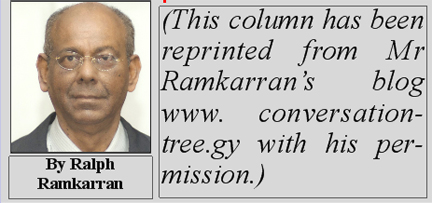Three differing interpretations of the Chief Justice’s ruling in the case of the Attorney General v David Granger and Raphael Trotman have been given. Attorney-at-law Basil Williams of APNU said that the Chief Justice upheld the decision of the Speaker by allowing Home Affairs Minister Clement Rohee to speak as a member of the National Assembly but not as Minister of Home Affairs. The Attorney General said that the “gag” order made against Minister Rohee by the Speaker had been removed. The Speaker said that he is appealing the decision because he requires clarification, but that in any event he was not bound by the Chief Justice’s ruling.
All of these distinguished gentlemen cannot be right. So what really did the Chief Justice say?
Before answering the question some background is necessary.
On July 30, 2012, the National Assembly passed a resolution, No 18 of 2012, expressing no confidence in the Minister of Home Affairs and calling for his dismissal. Following upon this resolution the Leader of the Opposition tabled a motion on November 22, 2012, which proposed that Minister Rohee “…be prevented from speaking in the National Assembly so long as he is purporting to carry out the functions of Minister of Home Affairs as published in the Official Gazette.”
 The effect of what Mr Granger was asking was that Minister Rohee should not speak at all as long as he holds the position of Home Affairs Minister.
The effect of what Mr Granger was asking was that Minister Rohee should not speak at all as long as he holds the position of Home Affairs Minister.
The Speaker ruled that (a) the motion be sent to the Committee of Privileges and (b) Minister Rohee “be prohibited from speaking or, not recognizing Minister of Home Affairs, Clement James Rohee MP for the purpose of presenting any bills, motions or making other presentations to the House.”
The Speaker later explained his ruling to mean that Minister Rohee cannot speak or present bills or motions in his capacity as Minister of Home Affairs but he can speak in his capacity as a member.
The Attorney General brought the case to declare the Speaker’s ruling unlawful and unconstitutional and to order that it be set aside.
The Chief Justice dealt with several issues which are not all necessary to be examined because they do not all relate to the issue of Minister Rohee’s right to speak. It is only this portion of the Chief Justice’s ruling which we are seeking to clarify.
The Chief Justice made two important conclusions, namely, that Minister Rohee’s right to speak in the National Assembly derives from his membership of that body and not from his position as Minister of Home Affairs and that, therefore, it is irrelevant for the purpose of the case that Mr Rohee holds the portfolio of Minister of Home Affairs. He said:
“If Mr Rohee’s name was on a successful list of candidates and his name was extracted from that list of candidates to hold a seat in the National Assembly on behalf of all members of that list but he was not assigned a ministerial portfolio, his right or privilege to speak in the National Assembly would not have diminished one iota by his non-tenure of a ministerial portfolio. Therefore, the prohibition must necessarily relate to Mr. Rohee only as a member of the National Assembly and not as Minister of Home Affairs… It is therefore irrelevant for the purpose of this case that Mr Rohee holds the portfolio of Minister of Home Affairs.”
Two shorter passages confirm the view of the Chief Justice which is outlined above. In the latter the Chief Justice said: “The legal truth is that Mr Rohee can speak in the National Assembly only as a member of the National Assembly and not as Minister of Home Affairs.”
Having concluded with clarity that Minister Rohee does not have separate rights of speaking as a member and as a Minister, but a single right as a member, the Chief Justice then proceeds to pronounce on the right. He said:
“It is indeed difficult to see how, in the face of the doctrine of separation of powers, the Speaker can prohibit a member (particularly an elected member) from speaking or making a presentation in that Assembly on account of the absence of confidence of the majority of the members of the Assembly in that person qua an executive Minister when he sits in the Assembly not qua Minister of the Government but qua member of the National Assembly.”
Several other passages confirm this position.
The Speaker expressed the view that the Chief Justice’s ruling is not binding on the Parliament. While it is true that the Chief Justice that: “It is no part of the court’s function to give directions to the Speaker of the National Assembly as to the future conduct of the Assembly’s affairs,” emphasizing that the Chief Justice was talking about “future conduct,” he also said: “In such an exceptional state of affairs in the National Assembly, the need for the court to intervene in the processes of the National Assembly does appear to arise in protection of his constitutional right as an elected member of the National Assembly.”
While the Chief Justice was of the view that Mr Rohee’s right to represent his electors in the National Assembly is not constitutionally enforceable, he clearly stated that “it behoves the Speaker and indeed the National Assembly as a whole to respect not only the finding of the court for reason of its finality but also the constitutional right to be represented by him in the National Assembly.”
Many peculiar situations are arising since the last general elections. Conventions are ignored. New ones are announced which never existed anywhere in Guyana or the world at large. Roles are reversed. Now, suddenly, the Parliament/Speaker is not bound by court orders.
Who would be able to complain if the executive takes the same position? (www.conversationtree.gy).









